February 6, 2009
It doesn’t seem possible that we can already be one month and six days into 2009. I’ve been posting so infrequently that the blog barely has a pulse. But it is alive I assure you. It’s just been sleeping, dreaming if you will.
It’s raining and stormy today and I’m grateful for that. I think this is only our fourth big rain of the season so far. My cat Tara had a bath a few days ago on a warm, sunny, dry day that got to 80 degrees and seems to have become typical weather this winter. At least it’s been easy on the heating bill. Not so easy on the water bill or my sinuses.
I’ve been away from blogs except to post my ramblings about Tarot at Spirit Blooms. I’ve worked off-line at my other computer on artwork, read or posted on a couple of favorite Internet forums (more than I should), and searched out alternatives on- and off-line to spending money that I don’t have on books that I dearly want. I started out reading about Carl Gustav Jung; now I’m reading the writings of Jung himself, beginning with his autobiography written late in life, Memories, Dreams, Reflections . Still deep in my J. R. R. Tolkien adventure, I recently finished reading The Annotated Hobbit, and now I’m savoring The Lord of the Rings. I’m a little shocked by how much watching the movies in the interim has botched my memory of the original story. Still they’re excellent movies. One should appreciate each on its own merits, the novel and the movies as separate creative entities. To do the written story complete justice there would’ve had to be nine or more movies instead of three. Not that I would complain, but not everyone is the Tolkien fiend that I am. Up ahead I plan to continue with The Silmarillion
. Still deep in my J. R. R. Tolkien adventure, I recently finished reading The Annotated Hobbit, and now I’m savoring The Lord of the Rings. I’m a little shocked by how much watching the movies in the interim has botched my memory of the original story. Still they’re excellent movies. One should appreciate each on its own merits, the novel and the movies as separate creative entities. To do the written story complete justice there would’ve had to be nine or more movies instead of three. Not that I would complain, but not everyone is the Tolkien fiend that I am. Up ahead I plan to continue with The Silmarillion and The Children of Hurin. Perhaps others, who knows? I’m taking my time, reading mostly late in the evening before sleep, if I’m not too tired by then.
and The Children of Hurin. Perhaps others, who knows? I’m taking my time, reading mostly late in the evening before sleep, if I’m not too tired by then.
Eric Mayer mentioned, in his comment on my earlier post about rereading favorites, that he almost never rereads books. I’ve been the same way most of my adult life. I reread a lot when I was a teen and young adult, but at some point I realized there was plenty in print to read the first time around, and life was short. I felt that I’d miss out on too many other things if I spent my time rereading favorites.
I’ve changed my attitude about that again only recently. This has to do partly with some of the newer fiction that I’ve been dissatisfied with, partly with my budget, and partly with the tiny library here in town where the tastes of the librarians don’t seem to mesh with my own — or I’m just quirky in my reading tastes. I’m sure they have some Tolkien and maybe some Jung, but I’ve come to prefer to take my time and not feel constrained by a return date anyway. I tried writing reviews here for a while, and I found that if the book was a library book I had to return it too quickly, and if I tried to write a review after that, I kept wanting to refer to the book. If I like it, I want it to stay around for a while. I also tried our library’s on-line interconnection with an ebook download system, but that didn’t work for me. Old computer or aging human brain inside user? Either way it didn’t work and I didn’t want to waste time fussing with it. I wanted to read the book. You know, just open a cover and start reading. If something is going to slow me down I want it to be the savor of words.
That brings me to the fourth reason I’ve gotten back into rereading. Mostly it has to do with wanting to read slowly. I’ve given up on reading everything out there. I’ve finally accepted that’s impossible. I’ve decided to hone down my reading list and read what I love — slowly, and as many times as I want.
When I reread an old favorite I don’t have to be in such a hurry to get to the end. I already know how it ends. There is something to the first bloom of a new story, that first time through when it’s a path of discovery, recognition, and suspense. But this time I can pause and enjoy the language along the way, let the suspense build again slowly. My old favorites have language worth pausing for. The more commercial books today tend to be heavy on suspense and bizarre plots and twists, while they seem too often short on the kind of writing I savor. Many feel to me as if they’re written in too much of a hurry, or as if the writer didn’t even like the story he was writing. The secret to great writing, I think, is for the writer to so love the story that he’s reluctant to leave it. Chances are the reader won’t want to leave it either.
But then I’m not a hurrier, never have been. I think it’s too easy to get into an “I’ll miss something if I slow down” mindset in our day and age, though it’s a valid concern to some degree. In the work world, one must hurry enough to show up when needed, and if one slows down one is in danger of not getting important work done, of missing opportunities, or of not being able to do one’s job anymore because one hasn’t kept up with hyperactive technology. There are sometimes valid reasons to hurry. I don’t want the emergency room team to dawdle, or firefighters to take their time arriving at a fire. For readers who want to keep up, there’s such a huge amount being published, in spite of aspiring writers’ concerns that no one is publishing what they write, that it’s easy to think one has no time to reread or to read slowly the first time. There are also such a great number of people who want to be writers that it doesn’t appear we’ll ever have a shortage of reading material, even very good reading material leaving out the bad. It’s a crowded world full of people with something to say, many of them excellent writers.
Still I think we miss out on too much by trying to do or read everything. I’m not well-read, mainly because I’m a slow reader. Maybe that’s why I appreciate books that take a long time to produce. I can sense the love and time that was put into them. I can linger, relish, and wonder why. I can spend a relatively equal time enjoying them, and feel gratitude that the authors took the time to do it right.
Tolkien took something like 13 years to write The Lord of the Rings between 1937 and 1949. He took longer, when one considers all the thought prior to beginning it that he put into creating the world of Middle-Earth, from the time he was a boy, and the time between 1949 and 1954 that he worked with his publisher to get everything just right. That time shows. And it’s not as if by taking that long he missed out on sales, which seem these days so unforgiving of anyone lagging behind. The only time any of his books went out of print was during Word War II and the after-war years, when paper was rationed in England. Oh, and there was the problem of some proofs being destroyed in a bombing or a fire (I don’t remember which) that caused further delay in getting one edition of The Hobbit back into print. Of course one important factor in his print longevity was in being Tolkien. There have been many imitators and, as Eric seemed to hint in his comment, most imitations have not held up very well. Time is, I think, one reason.
I’m certain that the biggest problems with many books is that they’re devised and written in too much of a hurry, and because they aren’t true to the writer’s own creative promptings. I can see some publisher urging a writer to create something like Tolkien wrote, but to do it right now. Imitation done in a hurry can rarely hold up to the proper process of creation. Sometimes, but not usually. Imitation as a whole is an iffy and questionable practice. Readers may say they want another story like The Lord of the Rings, but they’re not saying they want an imitation. They want more Tolkien, and that’s simply the best possible compliment to the original creator, not to any would-be imitator. Perhaps we sometimes, as readers, make the mistake of confusing the two ideas ourselves and go looking for another Tolkien when we should be looking for something else that’s new and fresh, and over which someone labored long and lovingly.
It’s been said that most of a writer’s work doesn’t take place at the typewriter or keyboard, or even necessarily with paper in hand. It happens inside the mind of the writer. I personally think every writer’s workspace needs a comfy couch, or a bed, and a window with a view of a natural setting or garden, as well as an immense library. I also think it’s safe to say that most great fiction writers have lived what they write. By that I don’t mean they’ve experienced it in physical reality. I mean they have a fertile and active imagination, an ability to visualize the experiences they haven’t actually lived. A relentless imagination at that. We use our imaginations to read, but the writer uses his imagination far more, over and over again, actively reliving the scenes he writes in his mind, working them out until they feel right, until he’s ready to translate them into written language. They get to know their own unconscious realms and facets of their own characters, as well as the archetypes of the collective unconscious, even more than we do ordinarily when we dream at night.
Now I know that some writers create at the keyboard on the fly. I’ve done that too. But the stories I’ve written that I felt best about were usually those that I had in mind for a long time before I dared to put any words down. They were an integrated collection of many things that occurred to me, including some fantasies, day dreams, things I wondered about, and even whole scenes, characters, or settings that occupied my mind well before I realized they’d formed anything close to a story worth sharing or writing down. Some were ideas I couldn’t put away because they begged to be told.
Fast writing may be part of the problem. I once rewrote a novel (Snow Angels) in the course of a few weeks, retyped the whole thing from scratch, from my head. But that story had been in my mind for a long time, in various forms, and even on paper in a few forms, before I did that. I’ve never taken part in NaNoWriMo, but I think it is possible for it to produce something of value, provided there’s something already percolating in the writer’s mind before they begin, perhaps for years before they begin typing it out. I’ve done fast writing exercises, and I know they have their value. But I wonder if the trend in fast writing is the reason so many new books I read leave me flat these days.
There is fast writing that’s great, and there have been many great prolific writers. But if we make the mistake of thinking their greatness lay in their proliferation, we do them a disservice. The secret to great writing also doesn’t lie in taking forever to produce something. I’m sure there are plenty of slowly written pieces of rubbish passing for fiction. But prolific writers are the exceptions to the slow writing rule, I think, and like Mozart’s music, great fast writing is great for other reasons than its speed of production or lack of revision. Of course everyone should write at their own speed, but fast writing of a single draft usually requires slow thinking up front, and long, slow revisions afterward. If one doesn’t take the time to do it right, to follow through, to consider it worth some effort, then even that smaller portion of fast writing time is wasted, not to mention the time anyone else takes to read the result. If it’s not worth spending lots of time writing, then maybe it’s not worth reading either.
In spite of how long Tolkien’s work has remained in print, it’s still possible that work of this kind is best done for oneself, with any idea or intent of publishing as a mere afterthought. One should, after all, consider oneself worth writing well and respectfully for. From what I understand of Tolkien, he only shared what he created with a few colleagues, friends, and his children, until the friend of a friend mentioned the possibility of publishing The Hobbit. Maybe that’s why it’s so good. He took time to shape and polish it to be what he wanted for himself and those he loved. Only after that did he shape and polish it for publication. Surely that provided him a great deal of satisfaction in what he wrote, regardless of whether strangers in his own land or across the pond liked it later on. He was also a real-life expert regarding myths of a world similar to the one he created and regarding the language he used to create it. But was he an expert who happened to come up with a story he was best suited to write, or was he a writer in the making, even as a child, who lived in his head creating a world first and who worked all his life to become expert at just what he needed to recreate that world on paper? Either way, he took his loving time about it, and that’s a good thing for all of us. After all, what’s the rush?
— Barbara @ 1:55 pm PST, 02/06/09
July 14, 2008
I had great plans for today, because I got so much done yesterday morning, outdoors. I finally got more seedlings in the ground — not the easiest task for someone with arthritis and fibromyalgia, who’s out of shape, and who’s working in hard, rocky soil. But I paced myself, got a lot done, and I felt good about it afterward.
I was so happy with the result yesterday that I planned to do more of the same today. Then I wakened later than usual, and not in the best mood. I dealt with kitty behavior issues right away, then I went to the store instead of starting work in the yard. Finally I came home to a hot late morning promising an even hotter day. So I canceled my plans to do more spading and planting, and here I sit indoors with the air conditioner on, wondering why that seems to happen so often. Not the hot weather. That’s to be expected this time of year. But I’ve noticed with many other things I do that when I make specific or detailed plans, they often fall through. Not just gardening tasks.
I realize now that even though I fooled myself for years, dutifully planning my work, both on the job and off, I’m really, at heart, not a planner at all. I’ve told my husband time after time how I like to plan things. But truth to tell, I’ve never actually been much for committing to anything. What I was really saying was probably that I didn’t like anyone else to make plans for me that might keep me from finding my happy accidental tasks. I think it’s because plans seem so often to change — and often for the best — that I’ve discovered this. Plans change. So why bother planning? Of course in the workplace that wouldn’t have flown. In any cooperative effort, plans make sense, because we depend so much on others getting their work done on time.
On my own, who needs plans? Maybe it’s something to do with being a generalist, not a specialist. But in a way I’m like this little cat, self-directed and easily distracted — by the right distractions. Those distractions often become momentary passions, obsessions that frequently happen to turn out really well.
Yes, I could tell myself, “Just get out there and do the damned gardening, like you planned.” But then the joy wouldn’t be in the effort, and instead of feeling good about what I accomplish, I’d be dehydrated, overheated, and feel terrible the rest of the day, possibly tomorrow as well. I know better. So I threw some water on the little transplants, and came inside. Maybe tomorrow morning. . . .
Still I wonder. Why do I get the most done when I don’t plan to? When it’s a spur of the moment, “I think I’ll do this right now” kind of thing? That’s what yesterday’s effort was. I woke up, got dressed, and started right in, because that was exactly what I wanted to do that morning, as soon as I woke up. I woke up inspired. This morning I didn’t. At least not with that inspiration, not with the one I expected.
I notice this is especially true with creative work of all kinds, and with learning, where it’s not the weather that changes things, but something unknown. Just when I wouldn’t think I’d even be in the mood for it, I get a whim and do that different thing, whatever it may be, and that’s when I get the most out of it. I seem to be most productive when I haven’t planned anything at all, when I pay heed to momentary flashes of inspiration or that sudden opportunity. Happy accidents and spontaneous productivity. Do you have them? My life seems full of them. They’re what makes me happy.
Here’s the real mystery: I don’t think it’s just about my mood or how I’m feeling, or the weather. It sometimes seems almost more like a synchronous universal dance of some kind. Sometimes all the pieces are in place, inside me and outside of me.
And it’s not just me. I think there are lots of people, like me, who’ve struggled all our lives to conform to a world that likes plans, schedules, rules. So much so that I grew up, and spent thirty years of adult life, thinking I was more comfortable with plans, schedules, and rules. Actually, as a kid, I never felt right about it. As an adult, I bought into it. Had to, to keep a job. But if that’s the way we should live life, how does one explain all those happy accidents by inventors, scientists, and discoverers through the ages? Granted, a certain amount of preparation took place before those historical happy accidents occurred. But many important discoveries in history weren’t planned. Not the way they turned out. Someone happened by chance to be in the right place at the right time, doing the right thing, or paying attention to what turned out to matter most.
Were they in tune with the synchronous dance of the universe?
For some people, I know this doesn’t work. Planning works for them. That’s great, more power to them. We need planners in the world, and maybe that’s their part of the synchronous dance. Someone has to read the music and keep the time. For me, not planning works. It’s about time I realized it.
Instead of gardening today, what will it be? I won’t know until seconds before I start, or perhaps after I’ve already begun.
— Barbara @ 12:10 pm PST, 07/14/08
March 15, 2008
Have you ever had trouble deciding which topic to read about next, or what to major in in college? Has anyone ever told you that you have too many hobbies? Have you ever thought about leaving a perfectly good job to look for something else that might interest you more — even if it doesn’t pay more? Maybe you’re a generalist.
This past Saturday, Dave Pollard at How To Save the World linked to an essay in his Links of the Week that he described as brilliant and liberating, and I agree.
The essay, by William Tozier of the Notional Slurry blog, is titled, There are exactly two ways: one, and many. The two ways he discusses are specialization and generalization.
William Tozier proposes the notion that we’re all evolved to be generalists, that specialization isn’t normal. I tend to agree when I consider that many of our forbears were more general in their skills and knowledge than we are. Even today, skills tend to be more generalized in humans living closer to nature, and survival in a wilderness requires a lot of flexibility.
When I think about it, the only things our earliest ancestors planned was to survive, and they were never sure how they would have to do that. The only things they finished were a good meal when food was available, or a new tool or garment when an old one wore out — often taking time to add improvements or embellishments, so even they were never finished. They paused to take in their world and observe it. They learned from everything around them. They were creative, they were nomads, and they were students of life. They paid attention to what came their way, they took them as signs of what they needed to do, for now.
William Tozier discusses the problem of explaining to specialists what we generalists do, how to label ourselves in today’s world. It can be a problem, and I think this must be why, long ago, I started to think of myself as a writer. Aside from having an aptitude for English and composition, a writer has to read and learn about many things in order to do what she does. Writing provides an excuse to research anything and everything, as possibly relevant to a project. Later still I began referring to myself as a creative person, because that can involve lots of different interests too, even more than writing. It can encompass activities that are finished when they’re finished, or never finished, rather than finished to deadlines. Of course writers have deadlines, if they hope to make money at it, and there the generalist has to adapt to the specialized modern world.
I conformed to the specialized world for years, in being a reliable employee and meeting deadlines. I glued myself to my chair and focused on my job. I met deadlines, and earned awards and promotions for my conformity and work ethic. But I wasn’t happy. I didn’t even feel healthy doing that. Eventually it became habit, and I got so I felt uneasy if I didn’t have a plan. So then I was really stuck — uneasy with my schedule and commitments, and uneasy when I didn’t have any.
After a lifetime of thinking I wasn’t doing life right, that I needed to be more energetic, and get more done, finish more things, I feel relief and satisfaction to realize that I’m a generalist and always have been — and there’s nothing wrong with that. It explains so much. Some people may think of being a generalist as a bad thing and call us dilettantes, or unwilling to commit, and some may even think it’s a sign of a problem, one of those recently defined mental disorders for which there always conveniently seems to be a new drug. (When did we start inventing diseases to match the drugs instead of the other way around?) Heaven forbid any of us should be anything but cookie cutter normal, whatever that means. In our culture it apparently means we have to specialize in something, we have to plan everything out, have goals and deadlines, in order to succeed. We have to finish long lists of things, and fill every minute with structured activity.
Today we don’t just have a work ethic, we have a work ethic on steroids.
I for one am ready to stop the madness. If we were intended to plan everything out, then why do we need artificial planners like Daytimers, Palm Pilots, and Blackberries? If we’re supposed to have jam-packed calendars and meetings overlapping meetings, then why didn’t we evolve to keep our schedules in our heads, and to be in two places at once? If we were supposed to travel the same road everyday, then why do we love vacations so much?
Unfortunately, being generalists brings some of us less material success in life, since it’s much less likely that we decide on distinct, well-defined career paths, and even if we do, we get this itch to change careers now and then. We’re looked down on when we tend not to finish things to a schedule — and I agree that makes sense when others are depending on us to finish so they can do their things. We’re often better off working on our own, to our own schedules, which are pretty much nonexistent, and without anyone else depending on us conforming to a schedule. Sometimes we’re called Jacks of all Trades.
Provided you figure out eventually that this is how you’re supposed to be, that there’s nothing wrong with you for wanting less structure and commitment in your life, being a generalist can bring a great deal of freedom and happiness. After all, what makes you happier than being yourself, no matter how many directions that may lead you?
I’m a generalist, and have been all my life. I’m grateful to finally figure this out. Thanks, William and Dave.
— Barbara @ 12:22 pm PST, 03/15/08
February 15, 2008
It turns out that this Snow on Mt. Palomar, back on December 9, 2007, was nothin’.
But you couldn’t have told me that three days ago, when our high temperature was about 80 degrees Fahrenheit, and I was certain spring had sprung with a summery vengeance. I almost tucked away my warm clothes and pulled out my summer shorts.
There was no more snow on Mt. Palomar. It had all melted since around Feb 5th, when the mountain didn’t boast nearly as much snow as in early December. I did get a nice view of the entire mountain with snow on it, from our polling place on the 5th. But I didn’t have my camera with me, so this view was from our yard. As you can see, it wasn’t as much as in December.
FEB 5
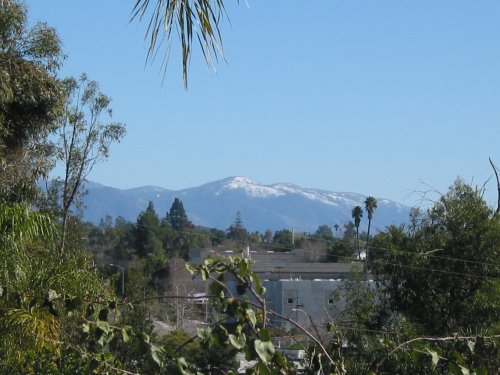
And like I said, by three days ago that was gone, melted. History.
But I’m glad I never got around to putting away my sweaters, because yesterday I don’t think the outside temperature ever rose above 50 degrees, and although the forecast had called for a light drizzle overnight, instead we got dark, threatening skies, cold wind, and steady rain for several hours yesterday.
I was sure that once the clouds parted there would be a fresh layer of snow on the mountains. But when they did, I couldn’t believe what I saw. Here’s our view just as the clouds lifted yesterday afternoon.
CLOUDS LIFTING
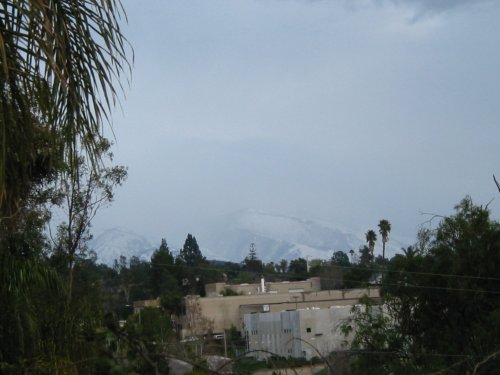
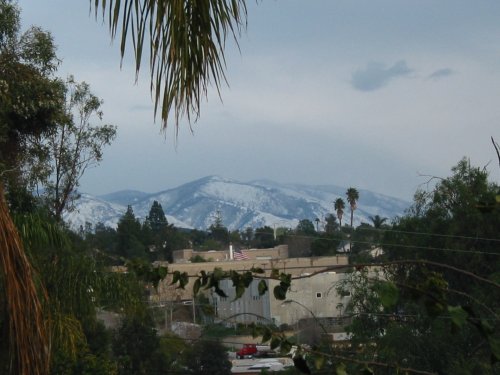
Below shows our view from our side yard at just around sunset yesterday, when the snow reflected the setting sun.
SUNSET
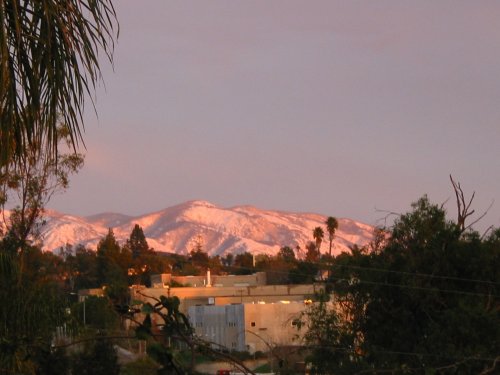
We can only see the lower, southern peak from our side yard, and that’s possible only in the past few months since we removed some obstacles. Below is a view of the entire mountain, from the vacant lot two houses down the hill, this morning. I’ve circled the portion visible from our yard in the second view below.
ENTIRE MT. PALOMAR VIEWED FROM DOWN THE HILL
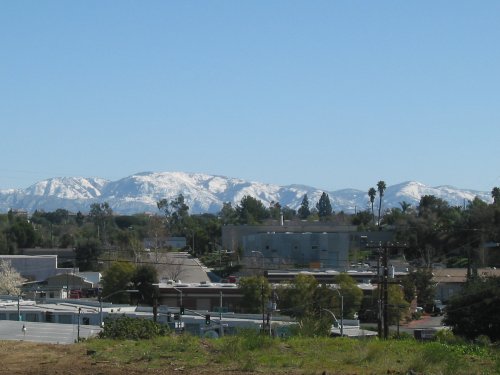
ENTIRE MTN WITH SOUTH PEAK VISIBLE FROM OUR YARD CIRCLED
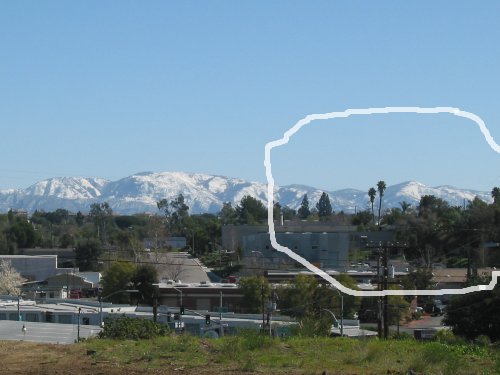
I don’t mind a little warm weather, and I don’t mind a little cold or rain. We can always use more rain around here, and snow is beautiful from a distance, but this snow looks more like Washington, Idaho, or Sierra snow than Southern California snow. Okay, maybe it’s like Big Bear snow. But it’s not normal San Diego County snow. We had roads close near Campo yesterday, which is near the Mexican border! Is it possible the entire region shifted north and we didn’t know it? It’s confusing, and I guess it’s time to dress in layers for a few weeks.
What the news people have to say:
A wintry surprise for area: Snow, sleet, hail, rain turn nice weather upside down
‘Slider’ brings rain around county, snow in moutains.
See what happens around here when it snows? People get stranded, roads close. Just a little snow can set us upside down and sideways. It’s not supposed to snow here.
But it sure looks pretty.
MORE PICS
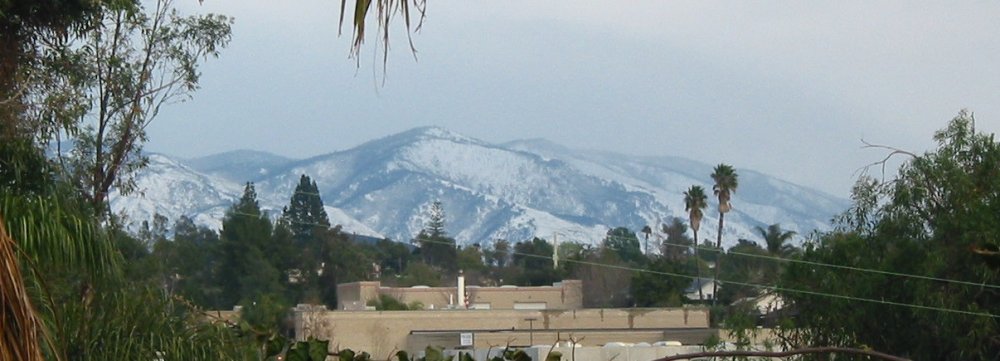
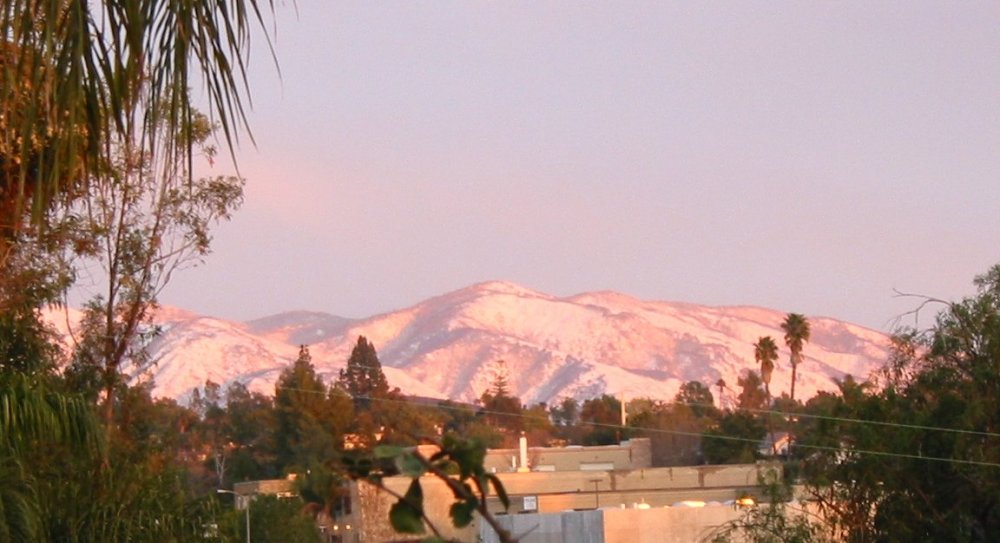
— Barbara @ 12:18 pm PST, 02/15/08
January 1, 2008
Happy New Year!
Today entered with a beautiful sunrise and left with a gorgeous sunset. What more could we want for the first of the year?
I’ve come to think that the day I enter a new year should be almost like any other day, that making resolutions for the entire year ahead isn’t really sensible. Anything can happen in the course of 12 months, and sometimes our focus changes completely due to forces outside our control. So instead of thinking about resolutions, I spent a lot of time in the past few days reviewing not only this past year, but my entire adult life. The whole-life review has partly to do with a journal project, basically sorting through a mass of accumulated pages from years of personal journal keeping and coming up with a way to edit them down to their essence and organize them, to preserve the memories without all the bulk. In the process I’ve read back through pages that I wrote at 18, 19, and 20 years of age. Wow, what a kid I was — and still am, in some ways. But it made me think a lot about choices and where they lead us, and how we define happiness and success at different times in our lives, especially how our focus shifts, sometimes suddenly, and what we spend our thoughts on. It made me face some of my regrets that I hadn’t considered or thought about in years.
Those regrets include hurting people’s feelings in any way — and I’ve committed some doozies, usually by accident but in hurtful, unthinking ways just the same. I regret changing my college major from English, leaving college without a degree, spending too much time in college distracted by and pining over young men, imagining potential relationships where it should’ve been obvious to me they didn’t exist, joining a church at 19, which distracted me even more from school and may have been what finally drew me away from it altogether — there were boys there (gag me with another repetitive, pining journal page) — and taking religion too seriously for even those few years, mistaking it for a deeper form of spirituality that it was not. Let me say right here, young women put far too much emphasis, or at least we did back then, on finding mates. It’s absurd. Though I eventually did, and have been with him for going on 25 years now, he wasn’t one of those responsible for distracting me in school, so you see all that pining back then was a complete waste. Later in life, I regret not buying a house sooner (though I’m not sure how that would’ve been possible earlier), not taking more vacations when I could afford them, buying even half of the magazines I ever purchased, spending rather than saving most of the excess I finally earned for a few years (and still not spending it on vacations), not buying a new car before I retired, and not giving up on being a novelist sooner. I’m serious about that — seven novels with no sale is too much — enough already!
In spite of those regrets, I’m pretty happy with most of my choices, especially in my spouse, and even in some of the jobs I didn’t like at the time but which were worth the opportunities and the friends they brought me. In fact all my experiences, including many I regret, taught me something of value.
Regrets are a waste too, so I won’t dwell on them, or on dreams or plans for the future. Instead I want to focus on now, on how I’m doing and what I plan in just the next few days or weeks. If there’s anything else I need to focus on more of the time, at this point in my life, it’s the same things I think we should always focus on, all our lives. Most of the people I know spend too much worry on whether we’re good enough, or what we’d change about the past. And some of us spend too much time worrying what others should do, or what should happen that’s out of our control, to make us happy. So I’m reminding myself yet again:
Be happy with myself, as I am
Don’t worry whether others like or approve of me
Treat myself and others kindly and with respect
Don’t let anyone tell me how I should live my life, and don’t tell anyone how to live theirs, as long as they’re not harming anyone
Stand up for myself and for the rights of others
Love life, and live it with passion and an open mind to possible outcomes
Have no regrets — let them go
Follow my bliss and enjoy seeing others follow theirs
Own my life
Don’t worry at all, let tomorrow take care of itself
Learn from everything
All my best regards to you for 2008, and good luck in the coming year.
— Barbara @ 6:43 pm PST, 01/01/08
December 23, 2007
A lot of people have been stressing over holiday preparations. I decided a few years ago that I would no longer fall into that trap. This is the first year I’ve managed to do it without much residual guilt, so this year is sort of a strange witnessing experience for me, where instead of being caught up in my own holiday madness, I have the opportunity to be aware how everyone else runs around doing what they think must be done or . . . or what? The holiday will fall on our heads like a big rock? Santa will fall out of the sky? Rudolph’s red nose will explode? The days will keep getting shorter instead of lengthening again, until they disappear? The Solstice is past now, so we can rest assured that didn’t happen. Whew!
In truth, each person tends to accomplish the things that are most important to that person. I know that sometimes in the past I wasn’t even conscious of what was really important to me. I was more conscious of what I thought was expected of me, or what everyone else seemed to consider important. I wanted everything for the people I loved, forgetting that what everyone really wants is . . . love. I felt guilty about what I didn’t do, or sometimes even resentful about what someone else didn’t do to help. But the important things got done just the same. Why can’t we be content with that and spend the rest of the time enjoying each other’s presence, or our memories of those who can’t be with us? (more…)
— Barbara @ 3:03 pm PST, 12/23/07
November 30, 2007

Bev Jackson has awarded me the Shameless Lion Award. This award originated with Seamus Kearney of (more…)
— Barbara @ 1:40 pm PST, 11/30/07
July 5, 2007
I decided to answer your comments in a new post, since some of my responses are lengthy. You’ve given me a lot to think about and helped me reconsider my feelings about critiques. Even though I disagree with some points, as they relate to my writing at this time, you all shared wisdom that deserves attention. (more…)
— Barbara @ 7:33 pm PST, 07/05/07
May 16, 2007
I’ve never been much for reading or watching the news, especially when I was younger. I used to catch criticism for not doing the grownup thing — watching the news or reading the paper as much as everyone else did. I managed to keep up with most of the important news, but I noticed early on that the news upset me, a lot. It got me worked up about things beyond my control, and raised my overall fear and frustration level, without giving me all the facts, or any resolution. It’s possible this news avoidance started when I had a brother serving in Vietnam and saw war news every night during the dinner hour. Maybe it began even earlier. But those negative side effects of the news stayed with me and seemed to outweigh or play down the benefits of keeping up with every little thing presented as news. (more…)
— Barbara @ 8:14 pm PST, 05/16/07
March 14, 2007
I’ve been struggling for topics to blog about, but surely there can be no more chilling thought for a writer than people not wanting books even when they’re free. Someone posted, on a mystery mailing list I belong to, that she boxed up what I’ll presume were mystery novels, and placed them out in front of her home, labeled as free . . . and had no takers. This was in a small university town.
The story surprises me, because in our former neighborhood, where our back yard faced a community college parking lot, we had excellent luck putting things out in the driveway for free, including boxes of used books. Sometimes people took entire boxes rather than a book or two. Nearly everything we put out found a home, including an old sofa we’d acquired already well-used, which I was certain we’d wind up hauling to the dump. Ours wasn’t a busy street except during classes, when students parked there, so I have to assume it was sometimes students who took those items. Then again, my experience with that was ten years ago. Now everyone I see walking around has a cell phone stuck to one ear, and I’m lucky if they avoid colliding with me. Maybe they wouldn’t SEE the books, even with a big sign.
When I was a student, I would’ve browsed through any box of free books on offer, even though I had plenty of other reading that I should be doing instead, for school. My grandmother used to say that no one in our family could clean an attic, because we’d stop to read everything. (That was before bubble wrap, when we used newspaper to wrap fragile items.)
Which reminds me, I dreamed just last night about the car I drove as a student. I hadn’t thought about that car in years. It was a white 1964 Mercury Comet that had a lot of miles on it before I got it. The dream was a mini-nightmare, not because I found myself in that car, but because this creepy guy who’d just followed me out of a bank removed what I thought was a disguise — a wig, under which he had a shaved head — then tried to get me to give him a ride. I was suspicious of him, so first I told him that if I did that my dad would kill me. (I must’ve been a teenager in the dream, which explains the car.) He argued with me, but I got into my car and locked the doors. It isn’t the sort of dream that usually qualifies as a nightmare for me, but it woke me up, heart racing.
That first car had some real-life nightmarish qualities. One was its tendency to overheat if I drove it to a higher altitude. I love the mountains, so not being able to drive my first car to the mountains without it overheating frustrated me no end. As the car aged, it developed other idiosyncrasies. I think my dad and I were at one point the only two people on earth who knew how to start it, which involved pumping the gas pedal just the right number of times, then holding it down . . . oh well, I don’t remember the sequence now. It had other problems too, and I have to wonder now at my desire to drive the thing, but when you’re young I guess you just want to go. You don’t care what you put up with to do it.
That car’s most nightmarish problem was the front passenger door’s sticky latch. My parents paid for my gasoline on the condition that I drive my grandmother anywhere she wanted to go. One day the door didn’t catch, and it flew open when I made a turn. Grandma didn’t fall out, but that incident qualifies as more nightmarish than the dream that ratcheted up my heart rate last night.
What about you?
Do you rummage through boxes of free books whenever you see them?
What was your first car like?
Do different things scare you in dreams than in real life?
— Barbara @ 10:38 pm PST, 03/14/07
![]() . Still deep in my J. R. R. Tolkien adventure, I recently finished reading The Annotated Hobbit, and now I’m savoring The Lord of the Rings. I’m a little shocked by how much watching the movies in the interim has botched my memory of the original story. Still they’re excellent movies. One should appreciate each on its own merits, the novel and the movies as separate creative entities. To do the written story complete justice there would’ve had to be nine or more movies instead of three. Not that I would complain, but not everyone is the Tolkien fiend that I am. Up ahead I plan to continue with The Silmarillion
. Still deep in my J. R. R. Tolkien adventure, I recently finished reading The Annotated Hobbit, and now I’m savoring The Lord of the Rings. I’m a little shocked by how much watching the movies in the interim has botched my memory of the original story. Still they’re excellent movies. One should appreciate each on its own merits, the novel and the movies as separate creative entities. To do the written story complete justice there would’ve had to be nine or more movies instead of three. Not that I would complain, but not everyone is the Tolkien fiend that I am. Up ahead I plan to continue with The Silmarillion![]() and The Children of Hurin. Perhaps others, who knows? I’m taking my time, reading mostly late in the evening before sleep, if I’m not too tired by then.
and The Children of Hurin. Perhaps others, who knows? I’m taking my time, reading mostly late in the evening before sleep, if I’m not too tired by then.












